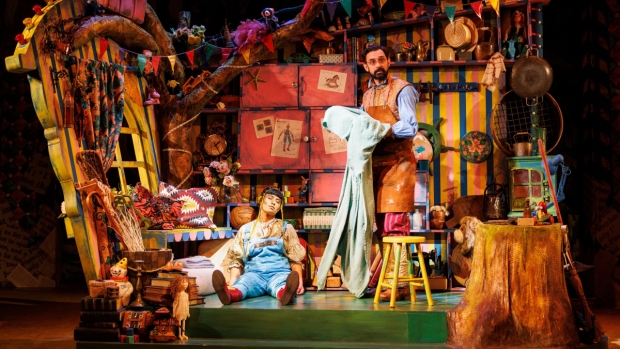”Pinocchio” at Unicorn Theatre – review

© Ellie Kurttz
The story of Pinocchio is currently en vogue, with new film and TV adaptations arriving like buses. It’s perhaps not a huge surprise that a story that revolves around themes of authenticity and truthfulness is suddenly proving so resonant with contemporary audiences.
This production at the Unicorn, adapted by Eve Leigh and directed by Justin Audibert, stays pretty faithful to the spirit of Carlo Collodi’s original Italian stories. It’s a welcome reminder of some of the darker edges of a character that is today synonymous with the Disney portrayal.
It starts off with an energising bit of audience interaction from Susan Harrison’s Marmalade the Cat, who after some ‘miaow’-based banter brings us into the ornate workshop of lonely toymaker Geppeto (Tom Kanji). Desperate for a child, he has fashioned a boy-like puppet (Peyvand Sadeghian) which – spoiler alert – soon takes on very human characteristics.
In a pantomimic flourish, the Blue Fairy (Eleanor Wyld) gives Pinocchio a conscience in the form of a mosquito, together with a warning that any lies he tells will be clearly known. It doesn’t take long for this to manifest in growing nasal form as Pinocchio heads to school and navigates the challenges of clingy best friends, bullies, and overbearing teachers.
The villain of the piece is toy salesman Fratello (a neat doubling by Kanji) who has an interest in Pinocchio remaining a puppet so he can flog him to the local castle-owning Duchess (Wyld) for her demanding daughter. After a rescue mission by Marmalade and some further adventures involving a luminous Dogfish, Pinocchio finally learns how to be human, just in time for Christmas.
Audibert’s production is sumptuously designed by Jean Chan, whose rendering of Geppeto’s workshop, which slides up and down the stage, is especially eye-catching. It’s a place any child would wish to hang out, and evokes a world where toys are magical works of art rather than cheap disposable tat. The whole thing has a folksy charm about it – from the way a fountain is created using handheld ribbons, to the accordion-playing of Sam Pay.
This is not a radical updating or an especially flashy staging. But Leigh, Audibert and the five-strong ensemble tell the story with great clarity and heart, showing that Pinocchio is so much more than a long nose. Particular credit goes to Sadeghian for manifesting the title character’s puppet form with such believability – it’s not often I can genuinely congratulate someone on a wooden performance.
In the season when so many folk tales are being reconstituted in panto form, the Unicorn is providing a solid alternative (for ages 7+). Although the moralising at the end is a touch heavy-handed, there’s certainly no shame in reminding young audiences of the importance of being yourself, and accepting others’ right to do the same.










